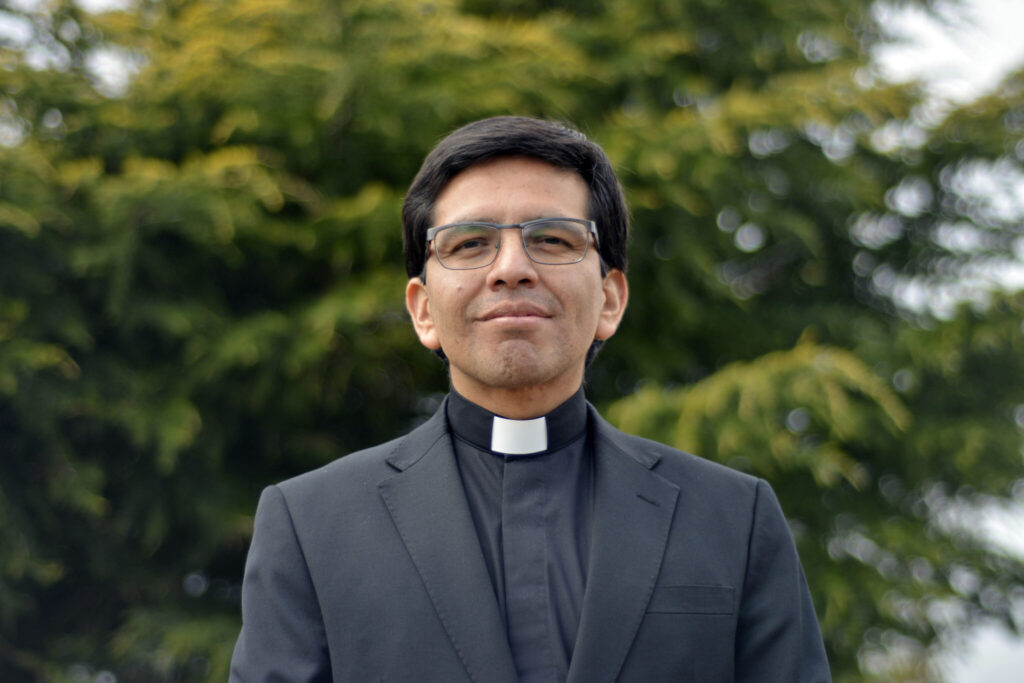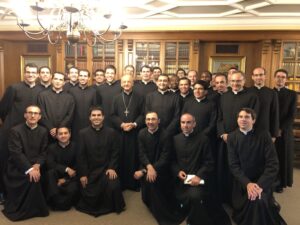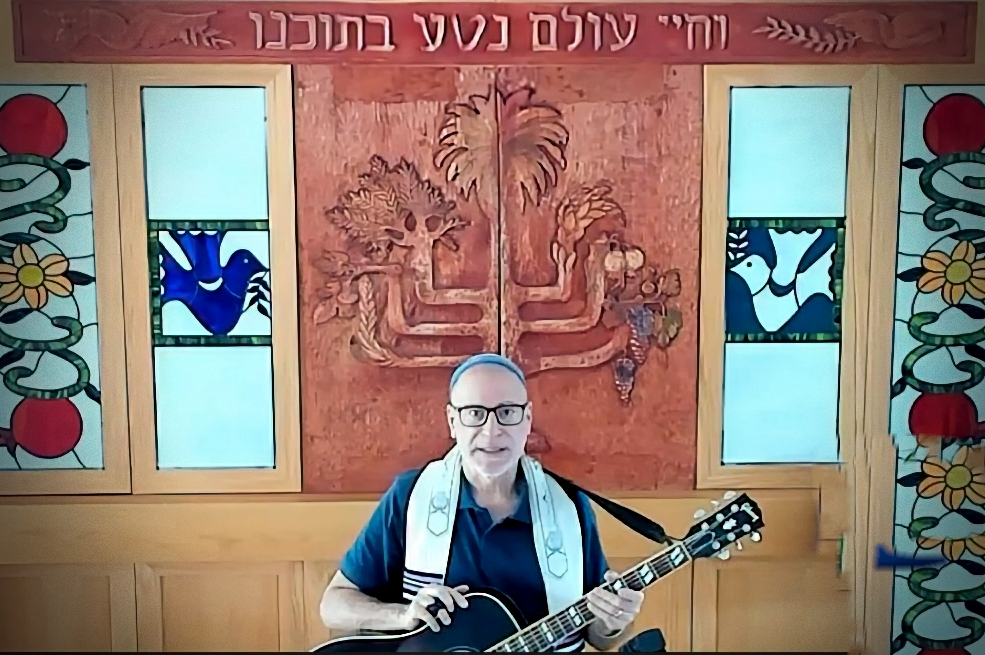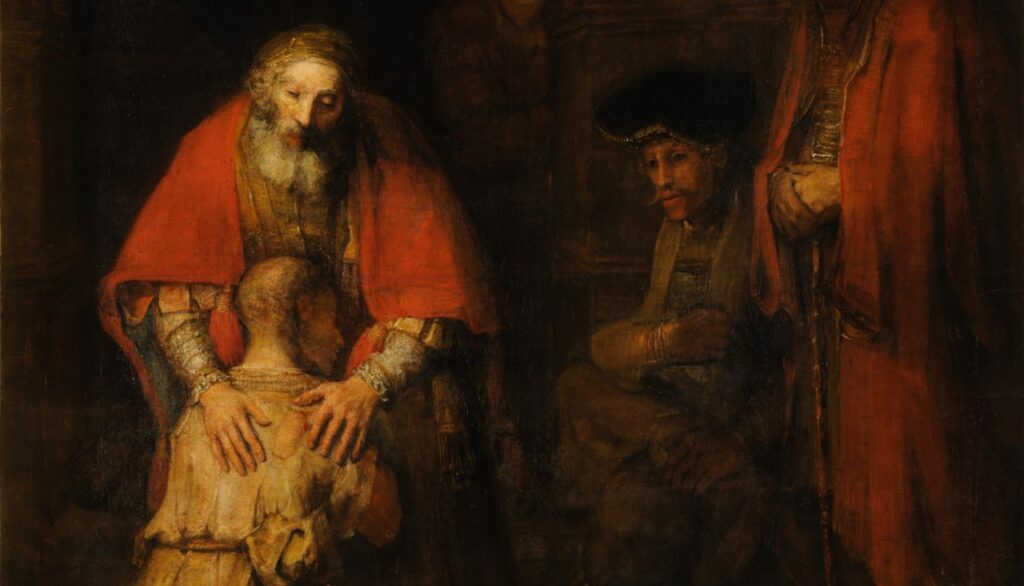«Training and tempering reduces the risk of doubting the path laid out by God»
Don José Luis Chinguel (Piura, 1981) was already an economist and philosopher before God definitively called him to leave everything to give himself to Him as a priest

In fact, he became a professor at the National University of Piura, in Peru, his native country. Nine years later he works again as a teacher in his city, but now teaching Theology classes at the University of Piura, a work of Opus Dei apostolate, of which he is also the chaplain of the Faculty of Engineering.
Father Chinguel moved to Spain to train being a priest, and at the University of Navarra he completed his Bachelor of Theology studies. Then he completed the Bachelor’s degree in Moral Theology and finally the Doctorate, whose thesis he defended in 2021. Meanwhile, Don José Luis was ordained a priest in 2020. Right after his ordination he spent several months in Murcia, in two schools in Fomento, until he was finally able to return to Peru to continue his priestly ministry.
In this interview with the CARF Foundation, this priest recalls with great affection his time in Pamplona, his priestly ordination in Rome, the fruits of the formation that he has received in these years and the great memories that he has already experienced once ordered.
God, the Lord of Miracles
He has lived in Europe and also in Peru, his native country. What similarities and what differences have you seen in the faith and the Church in both places? During my stay in Europe I was only able to visit Spain, France and Italy. They are nations with a long Catholic tradition, but they still maintain the faith in sectors of the society of each country. Yes, I have noticed the advance of the secularization process, but God continues to stir up in hearts a desire to seek Him and to give oneself to His service. In fact, I remember that, at the university, during the Theology sessions and other conferences, I noticed the presence of students from other faculties, especially Medicine, very interested in hearing topics of faith and religion that were offered to us.
The great advantage of Europe, in my opinion, lies in being close to Rome, the center of Catholicism, as well as being close to historical places for the faith: Santiago de Compostela, Assisi, Fatima, Lourdes, and others. For its part, Peru is characterized by being officially and mostly Catholic, although the practice of faith is clearly less. However, popular devotion has a powerful “pull” among people. There is one in particular that is very deep-rooted, and that is that of the Lord of Miracles, to whom many Peruvians pay great devotion.
You studied in Pamplona, what was your experience like? In fact, I studied in Pamplona since September 2015. A beautiful experience. I arrived there when I was 33 years old, after having practiced the profession of economist for more than ten years. It was a return to the classrooms that was difficult for me at first. I had to work a little to catch up with the rest of my classmates.
What caught your attention the most about your time at the University of Navarra? Several things. The beauty of the campus, the great variety of students’ backgrounds and, above all, how organized the university is. Another striking thing was that the Theology students were considered the same as the rest of the students from other faculties, with the same rights, the same obligations and with access to the same places as the others. I pleasantly remember the cordiality of the secretaries, of those who serve in the library…
How has the training you received helped you in your pastoral work? The studies in Pamplona at the Faculty of Theology of the UNAV have not only helped me to delve into the knowledge of Sacred Theology, but also in the good habit of looking for reliable sources to turn to for the preparation of preaching, which is a constant in the priestly ministry.
And in the more personal and spiritual realm? Without a doubt, having lived in the Aralar Major College, where Saint Josemaria was, whose spiritual trail has left a great mark on me and on the people who knew him and who passed on to me in very interesting gatherings and, in general, in all the activities of study and training that I received there.
What have been the most memorable moments you have experienced as a priest? The day after being ordained in Rome, I went to St. Peter’s Square for the Angelus with the Pope. When we finished, the people I was with decided to go to lunch in the Trastévere neighborhood. While there, on one of the streets we passed, there were a couple of young ladies who were collecting signatures. One of them came up and said to me, very quickly, some words that I didn’t understand; and then she asked me in Italian to give her a blessing. For me, it was the first act as a clergyman: giving a blessing to a person.
 But, above all, I remember the moment of my ordination, which I cannot explain. I noticed that culminating moment during the laying on of hands that the cardinal who ordained us did.
But, above all, I remember the moment of my ordination, which I cannot explain. I noticed that culminating moment during the laying on of hands that the cardinal who ordained us did.
The first baptism I officiated was something special
And anymore? The first Mass that I had to celebrate, which was in the Roman church of San Girolamo della Caritá. It was a gift from God because it was a beautiful church, because the cardinal of Lima and several compatriots who heard about my ordination and wanted to attend attended. A day later, I passed through France, heading to Pamplona along with five other priests. We spent the night in Lyon and the host encouraged us to go to Ars and celebrate Mass there, in the chapel where the patron saint of parish priests and priests, Saint John Mary Vianney, is located. It was another great gift from God.
I will also never forget the first baptism I officiated, it was something special. Also, the first wedding celebrated in Piura. In the conversations before that wedding, I told the bride and groom that I was more nervous than them, but that I would try to calm myself down and give them confidence.
From the experience that you already have, what do you think is what the priest needs in the face of the numerous challenges that he faces every day to bring God to others? Looking into perspective, not only the studies that train us a lot and help us well to face the challenges of our ministry, but also the fact of forging spiritual temper and enriching the soul. I think this reaffirms us a lot in our vocation and thus reduces the risk of doubting the path outlined by God.
On the other hand, the financial aid received for studies includes accommodation in a good residence or dormitory in sufficient conditions, which educates us in the dignity that as priests we must take care of, if possible with a little more demand, when exercising the ministry.
Would you add anything else? Yes, the sport that one tries to do at this time also constitutes a healthy habit for the task of helping souls. Thus, priestly overload can be dissipated and better coped with. Every Sunday I organized a futsal game in the sports hall of the University of Navarra.
Do you want to say something to the benefactors of the CARF Foundation? To the benefactors of the CARF Foundation, I express my sincere gratitude. I would like to tell you that your generosity does a lot of good and that God Our Lord will take it into account as merits for you and your family. Count on my prayers, even if I don’t know you personally. Through the communion of saints, I think that the prayers of priests benefit all those who have made their formation and ordination possible.
Related

The International Academy of Catholic Leaders: Renewal and Commitment to its Mission
Exaudi Staff
30 March, 2025
4 min

Reflection by Bishop Enrique Díaz: The Heart of the Father
Enrique Díaz
30 March, 2025
5 min

Sunday Psalm: Worshiping God Is Not Enough—Words and Actions Matter
Heschel Centre for Catholic-Jewish Relations at the Catholic University of Lublin
30 March, 2025
2 min

Tomorrow is Laetare Sunday, but COVID is no longer present
Padre Antonio María Domenech
29 March, 2025
5 min
 (EN)
(EN)
 (ES)
(ES)
 (IT)
(IT)

